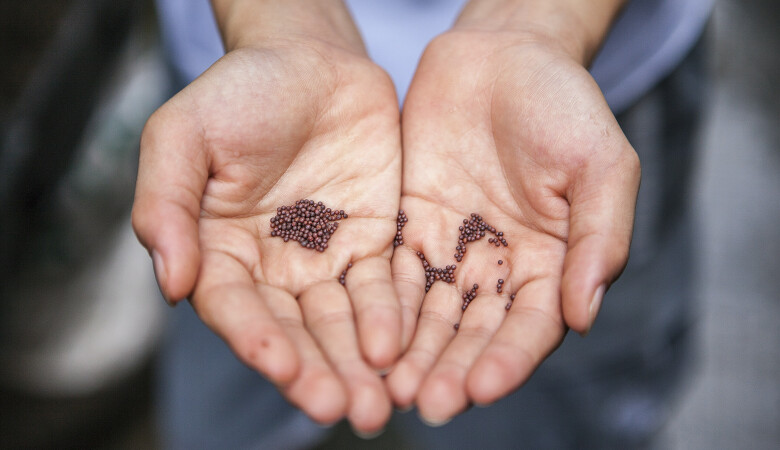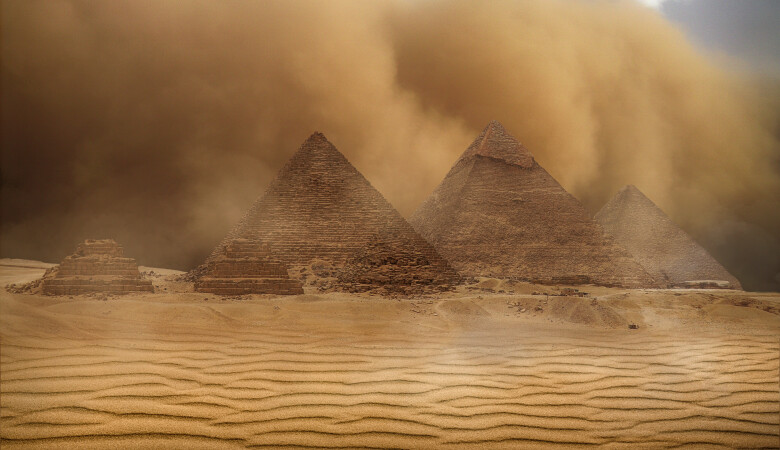God's Glorious Invitation to a Holy Banquet (Isaiah Sermon 64 of 80)
February 22, 2015 | Andy Davis
Isaiah 55:1-5
Calling, Evangelism
Pastor Andy Davis preaches a verse-by-verse expository sermon on Isaiah 55:1-5. The main subject of the sermon is spending time doing things that benefit God's kingdom and satisfy our souls.
So in March of 2010, there was an auction for a hand-written invitation by Charles II, to a personal friend to attend his coronation as King of England. It was written in 1660, the coronation was to happen in 1661. Now, 11 years earlier, Charles's father had been executed and he, Charles, had fled the country and now England wanted him back as their monarch. And Charles wrote a hand-written note to Lord Sandys, his personal friend, to invite him to the coronation. I don't know what the hand-written note went for, how costly it was, but I would submit to you that the invitation that we have in Isaiah 55 is far more costly, and it's to a far greater coronation and a far greater banquet than anything that happened when Charles II was reinstituted to the throne in England. You are invited, all of you, and me too, all of us invited by the King of the universe to the wedding banquet of the lamb.
We get to sit a table with Jesus and feast with him and his people for all eternity. You are hereby invited. And today, my joyful task is to make clear that invitation to you and to do everything I can to persuade you to take it. To do everything in my power to persuade you to not be foolish and to disregard this invitation and to walk away as those did in the parable that Jesus told of the king who wanted to prepare a wedding banquet for his son, and sent out messengers to invite the people to come, but they refused to come. And one said, "I'm too busy with my business." Somebody else said, "I have just bought a yoke of oxen," and others just had no interest at all. And so it has been for 2000 years. The invitation to come to the wedding banquet of the lamb has been spreading to the ends of the earth and many, many have heeded it, and have come to Christ. And so you are hereby invited.
Look at the words in verses 1-3 right away, "Come all you who are thirsty, come to the waters, and you who have no money, come buy and eat, come buy wine and milk without money and without cost. Why spend your money on, what is not bread and your labor on what does not satisfy. Listen, listen to me and eat what is good and your soul will delight in the richest of fare." We'll just stop there. What is the context of this invitation? Where does Isaiah 55 sit in this flow of thought in the Book of Isaiah? Well, we could pick up at Isaiah 53, as Rick was talking about, in the majesty of God, of God's Son, and the atoning work of Jesus Christ. The greatest chapter of prophecy in the Bible. And there we learn that Christ is our substitutionary atonement.
There, Jesus, we learn, died in our place as our substitute for our sins. In Isaiah 53:4-6, it says, "Surely he [Christ Jesus] took up our infirmities and carried our sorrows, yet we considered him stricken by God, smitten by him and afflicted, but he was pierced for our transgressions. He was crushed for our iniquities, the punishment that brought us peace was upon him, and by his wounds, we are healed. We all like sheep have gone astray, each of us has turned to his own way, and the Lord has laid on him the iniquity of us all." That, dear friends, is the glowing center of the gospel, substitutionary atonement. Jesus dying in our place, we the sinners, he, the righteous one.
We deserve to die physically and eternally in hell, and yet Christ came and died in our place and took the wrath that we deserve, so that all of us who by simple faith in Christ have looked to him as our substitute, as our atoning sacrifice, are forgiven. Set free from guilt, made new, as we heard from Maxwell. And how in Isaiah 53, his atoning death is clearly predicted that he would die. In Isaiah 53:8, he was cut off from the land of the living. "And for the transgression of my people, he was stricken, he was assigned a grave with the wicked and with the rich in his death though he had done no violence nor was any deceit in his mouth."
But not only does Isaiah 53 clearly predict Christ's substitutionary death, it also predicts his resurrection from the dead. The cross and the empty tomb, both clearly predicted in Isaiah 53. It says in verse 10 of that chapter, "Though the Lord makes his life a guilt offering, he will see his offspring as children and prolong his days, and the will of the Lord will flourish, will prosper in his hand, and after the suffering of his soul, he will see the light of life and be satisfied. And by his knowledge, my righteous servant will justify many."
So this incredible gospel of Jesus Christ, so clearly written out for us by Isaiah the prophet seven centuries before Jesus was even born, is the joyful message of salvation that's going to go forth to the ends of the earth, to the ends of the earth. People in distant lands, kings will hear about him and rise up and they will fall down on their faces and by faith they will worship him. Christ is the Savior, Christ, this Gospel message, going forth to the ends of the earth is the message, I think, of Isaiah 54, the grand missionary enterprise of the church. A tent enlarged, many people included, Isaiah 54:2-3, where Zion is told, "Enlarge the place of your tent, stretch your tent curtains wide, do not hold back, lengthen your cords, strengthen your stakes, for you will spread out to the right and to the left and your descendants will dispossess nations and settle in their desolate cities."
And so, the expansion of Zion, the expansion of the people of God, it's going to be really, really big. We talked about that last time, remember William Carey's deathless sermon, at the beginning, the dawning of Protestant missions and the advancement of the gospel to the ends of the earth, as William Carey was soon to go to India and many others would follow after him. Adoniram and Ann Judson going to Burma, and many other missionaries taking this invitation to the ends of the earth.
I. Who Are Invited? Destitute, Dissatisfied Sinners
And now we come to this invitation in which Christ is calling to sinners to come and to feast on him. And so, look, at verses 1-3, "Come all you who are thirsty, come to the waters, and you who have no money, come buy and eat. Come buy wine and milk without money and without cost. Why spend money on what is not bread and your labor on what does not satisfy? Listen, listen to me and eat what is good in your soul will delight in the richest of fare. Give ear and come to me, hear me, that your soul may live." Now, in this text, we have two different types of people invited immediately. The gospel invitation understands the different condition that people find themselves in.
Not everyone experiences the same things in life, but everyone is needy, truly, deeply needy. Just some people know that they're needy and others don't seem to know it as much. So first we have invited the thirsty and the destitute. These are people with nothing to offer, and they know it. And then second, the self-sufficient, but dissatisfied strivers. People who have resources, they have options, they're trying things, but they're never satisfied.
The Thirsty and Destitute
So first, the thirsty, and destitute, "Come all you who are thirsty, come to the waters, and you who have no money, come buy and eat. Come buy wine and milk without money and without cost." God is inviting deeply thirsty people who are dying, they're withering in life, but they have no resources whatsoever and they know it, they know it.
They look at their lives, and it looks like a field of dead weeds, like a corn field in late November, dead stalks swaying in a freezing wind. And there's this picture of barrenness, there's nothing there, and they know it. Life has dashed all your hopes and dreams, everything you've tried to bring meaning to life has ended up fruitless. You're depressed, you're discouraged, your soul feels like you're crawling through the Sahara Desert and if you don't get to water soon you will surely die and you know it. But you have no resources whatsoever, you're poor, you're needy. You have nothing to offer the Lord, you're not in any bargaining position, you have no ace in the hole, you've reached the end of your life and you have nothing in your hands you can trade, nothing at all.
The text says you're exactly the person the Lord is calling. You're exactly the one Christ came to save. You are the spiritual beggar of Matthew 5:3, at the beginning of the Sermon on the Mount, Jesus said, "Blessed are the poor in spirit for theirs is the kingdom of heaven." There in Matthew 5:3, the word "poor" means beggar, somebody who has literally nothing. And blessed are you, happy are you, deeply, richly, happy are you if you're a beggar with nothing to offer, because yours is the kingdom of heaven. And Jesus is standing before your soul right now with his arms stretched open wide, saying, "Come all you who have nothing to offer, all you poor beggars, you come to me." That's the first category of people that are invited in our text.
Second... the Self-Sufficient but Dissatisfied Strivers
Secondly, we have self-sufficient, but dissatisfied strivers. Verse 2, "Why spend money on what is not bread and your labor on what does not satisfy? Listen, listen to me and eat what is good and your soul will delight in the richest of fare." Perhaps very few of you may feel in the first category. You actually may think of such a desperate person who has nothing left to live for as a loser. You may actually, in some ways, feel superior to that person, you still have options, you still have resources. Well, verse 2 is for you.
You have money to spend and you're spending it, you're buying things. You have energy by which you are laboring and you're spending it, you're working, you're achieving things, you're working every day to better your lives. You're working in some ways to improve your souls, your spiritual conditions, but the text calls on you to be honest about all this. You're spending your money on what does not satisfy and you're achieving, you're earning, you're working and you're accomplishing, but honestly, nothing satisfies.
John Piper put it this way:
“He is still spending and still working, dreaming, chasing, searching, experimenting—different job, different city, different car, different house, different wife, new computer, new boat, new books, new bike, new grill, new season tickets, new diet, new looks—there's still a lot of looking around left in this person. But still no pot at the end of the rainbow. No fountain of youth. And every triumph peters out. The applause fades. The boat is boring. The style passes. Everything new gets old and the options get fewer and fewer.
When you are honest, you know there is a canyon of need and longing on the inside no matter how self-sufficient you look on the outside. And God knows even better than you. He has you in mind when he says, 'Why do you spend your money for bread which is no-bread, and labor for dreams that do not satisfy?'"
Well, everyone that's here today fits in one of those two categories if you're apart from Christ. Either you're totally destitute and no hope at all or you've been striving, you're filled with resources, dissatisfied. The question is, do you know it's not satisfying? Do you know that the next thing you're going to try isn't going to work for you? Well, these are the people that the Lord is inviting right now.
II. What Is Offered? Water, Milk, Wine, Bread
But what is he offering? What benefits does he pour out on you if you should come? Well, he's portraying a feast here, and he begins with the beverages, he's offering some beverages to us, so this is the drink service of heaven.
The text spreads out an amazing banquet for our souls and in verse 1, it speaks first of three beverages, and each beverage represent something different that the Lord wants to do for you. "Come all you who are thirsty, come to the waters, and you who have no money, come buy and eat, come buy wine and milk without money and without cost." Now, verse 2 implies food that is truly richly, deeply satisfying where nothing else ever has before. So here, verse 2 is the feast of food, "Why spend money on what is not bread and your labor on what does not satisfy? Listen, listen to me and eat what is good and your soul will delight in the richest of fare."
It moves on to food in verse 2. Let's focus first on the beverages. First water and then I'll reverse the order, then milk and then wine. Water brings life, water brings life, water represents life. "Come, all you who are thirsty, come to the waters." Without water, we cannot live, we will die. Recently I read the book and then watched the movie Unbroken. Some of you have seen it or read the book about Louis Zamperini, he's the Olympic distance runner, World War II bombardier and B-24 bomber. He crashed in the Pacific and survived the crash with two of his fellow airmen.
And the three floated in a raft eventually, Louis floated for 47 days out in the Pacific Ocean. They had to fend off multiple shark attacks, they were strafed by a Japanese plane, but by far the greatest imminent threat to their lives was thirst, thirst. They were surrounded constantly by water, but none of it could be drunk, none of it, it was all salt water. It would have been deadly to them to drink it. They were in imminent danger of dying from thirst, until a rainstorm came and saved their lives, their very lives, and they did everything they could to drink from it and to save up water for the future. And that rainstorm saved their lives.
So, Isiah 55 invites people who are spiritually dying to come to Christ and receive the life-giving water that he alone can give. I don't think you can read this verse without thinking about Jesus' encounter with the Samaritan woman at the well, of course. Jesus had to go through Samaria, and there he encounters at high noon, a woman, a Samaritan woman who comes to draw water, and there's this Jewish man waiting for her. And he initiates contact with her, which shocked her. He said, "Give me a drink," and she said, "'How is it that you a Jewish man ask me for a drink since I'm a Samaritan woman?' Jews have no dealings with Samaritans. Jesus answered her, 'If you knew the gift of God and who it is who asks you for a drink, you would have asked him and he would have given you living water.' 'Sir,' the woman said, 'You have nothing to draw with and the well is deep.'" I'm always amazed at how pragmatic the mind of a woman is. They just know how things work. And as I perceive, I've been here lots of times and you have no chance of getting me anything. "'Where can you get this living water? Are you greater than our father Jacob, who gave us the well and drank from it himself, as did also his sons and his flocks and herds?' And Jesus answered, 'Everyone who drinks of this water will thirst again, but whoever drinks of the water that I give him will never thirst. Indeed, the water that I give him will become within him a spring of water welling up to eternal life.'" I hear that in Isaiah 55:1.
I do, Jesus is standing before us offering to become for us spiritual water, a well of water from which we can drink any time, and it will well up to eternal life. We will drink and we will live, and not just temporarily, we will live eternally. Jesus is offering that to us.
Milk that Gives Nourishment
Secondly, he speaks of milk and I think the image here is of nourishment, of nutrition. "Come all you who are thirsty, come to the waters, and you who have no money, come buy and eat, come buy wine and milk without money, without cost." So, I'm going to reverse the order and talk about the milk first. Milk is different than wine... Different than water, sorry, and then it refers to nourishments, to nutrients. You think how a nursing baby gets everything that that baby needs from the mother's milk.
All the incredible vitamins and nutrients, everything needed for life. So God is calling on us to come to him day after day for the milk that we need for health and strength, and this I believe is directly linked to the word of God. The ministry of the Word of God to your souls, 1 Peter 2: 2-3, it says, "Like newborn babies crave pure spiritual milk," or some translations, "The pure milk of the word, so that by it you may grow up in your salvation, now that you've tasted that the Lord is good."
So that's the richness of the image of milk and it's a rich image of flourishing really, like the promise land was spoken of as a land flowing with what? Milk and honey. So, there's this rich image of everything you'll need for vitality and flourishing and growth for your soul. Thirdly, we have this image of wine and there, the image I think is of joy, of celebration, of vitality in rejoicing and celebration. Now, we're aware in our world of the danger of drunkenness, and though Christians have been rightly concerned about the damage that alcohol has done to the lives of so many, yet any Bible reader knows that wine usually is spoken of in the Bible as a symbol of joy and celebration, rich blessing of God. So we have in Psalm 104 verse 15, God lavishly gives "wine that gladdens the heart of man, oil to make his face shine and bread that sustains his heart."
John Piper says this:
"Wine corresponds to the need for exhilaration. We want to live and not die. We want to be strong and stable instead of weak and wavering. But that is not all we need in life. No matter how stoic, unemotional, phlegmatic, laid-back, or poker-faced we may seem to others, there is a child inside of every one of us that God made for exhilaration—for shouting and singing and dancing and playing and skipping and running and jumping and laughing.”
That's as exuberant as I'm going to get in this sermon, right there. But we were made to celebrate, we're made to rejoice. The joy of celebration. What makes a feast a time of delight? This is why I believe Jesus changed the water into an abundance of high quality wine at the wedding at Cana in galley. Now, many, I think rightly see the fulfillment of this as the gift of the Holy Spirit.
The Holy Spirit has come to give us that joy in life, that celebration, that exhilaration. And so, wine and the Spirit are linked in Ephesians five, where it says, "Don't get drunk with wine which leads to debauchery, instead be filled with the Spirit, speaking to one another with psalms, hymns and spiritual songs, singing and making music in your hearts to the Lord, and always giving thanks for everything to God the Father in the name of the Lord Jesus Christ."
Acts 13:52, "The disciples were filled with joy and the Holy Spirit," or Galatians 5:22 simply, "The fruit of the spirit is love, joy, peace," etcetera. So, that's what wine means, to me, the joy and exhilaration of celebration of singing and shouting and dancing and we are going to in some very holy way, cut loose when we're in the wedding banquet of the lamb. We're going to cut loose and there won't be any debauchery or drunkenness, or any of that, they'll just be unbridled joy when we see the bridegroom. It also mentions bread that satisfies and a feast for all eternity. He says, "Why spend money on what is not bread and your labor and what does not satisfy? Listen, listen to me." And it says in the KJV, "Let your soul delight itself in fatness," fatness, fatness being a good thing.
The verse speaks of the bounty of the best possible foods. It challenges us not to eat bread that doesn't satisfy, to find true bread that does satisfy. And it goes beyond bread to talk about a banquet with the richest of fare, the best possible meats, perfectly cooked. I don't know what kind of cooks they have up there in Heaven, getting ready for our resurrection body banquets, but they know what they're doing and it's going to be really, really fine. But this is a metaphor also for the deep rich satisfaction that comes from walking with God.
Your soul will be delighted with this. We can't help but go back to Christ again, first to his body, being given as bread for our souls, given on the cross, it says in John 6:35, "Then Jesus declared, 'I am the bread of life, he who comes to me will never go hungry and he who believes in me will never be thirsty.'" And again in that same chapter, "I am the living bread that came down from heaven. If anyone eats of this bread, he will live forever. This bread is my flesh which I will give for the life of the world." So Jesus' body dead on the cross, completely pays for all of our sins in the sight of Almighty God and we're going to feed on that eternally, forever.
We're going to partake, feed and live forever, on that. But it goes beyond to the richest of fare and that is just such an image of a well-laden table, a banquet table, just spread out and beautiful. And that language was already used earlier in Isaiah 25:6-8, magnificent passage there, Isaiah 25 and it says, "On this mountain, the Lord Almighty will prepare a feast of rich foods for all peoples, a banquet of aged wine. The best of meats and the finest of wines. On this mountain, he will destroy the shroud that covers all nations, the sheet that unfolds all peoples. He will swallow up death forever." That's the banquet, the resurrection is the banquet.
Knowing that death has died, death has been thrown in the lake of fire, we'll sit at the banquet table there in the kingdom and know that it will never end. Our friendships will never end, death is gone forever. The faces we're seeing there at that time we'll see them forever. And we'll feast in the kingdom forever and how sweet will it be, the best of meats and the finest of wine.
III. How Do We Receive these Gifts?
So how do we receive these gifts? There's a series of commands in these verses, 12 in all, listen to them. "All you who are thirsty, come to the waters." That's number one. "And who has no money come," number two, "Buy," number three, "And eat," number four. "Come," number five, "Buy wine and milk," number six, "Without money and without price. Why do you spend your money for that what is not bread and your labor for that which does not satisfy? Harken diligently to me," number seven, and, "Eat what is good," number eight, "And delight yourselves in fatness," number nine. "Incline your ear," number 10, "And come to me," number 11, "Hear," number 12, "That your soul may live." 12 commands here.
We're not just supposed to listen and lay back here, we're commanded to do something. And you can take those 12 and group them into a sequence, like this, "Come, buy, eat, and enjoy." That's what we're told here. Come, buy, eat and enjoy.
We're not to be passive here, we must obey this amazingly rich and generous invitation. We must do what it says, we must come to Christ and not turn away in unbelief. Now we come to the mystery of buying something without any money. How do you do that? How do you buy with no money? Actually, there are a lot of Americans that do that all the time, so maybe it's not so much of a mystery, I don't know. It does happen from time to time, but I'm going to stick with a theological question and not the practical economic question.
How do we do this, how do we buy something? Well, first the idea isn't that this thing isn't expensive. Oh, it's expensive, it's infinitely expensive. You can't measure how costly this is. But it's already been paid for in advance. You get to the boutique you get to the shop, you find out, it's got your name on it, and it's already been paid for. 1 Peter:1, 18-19 it says, "For you know that it was not with perishable things such as silver gold that you were redeemed from the empty way of life handed down to you from your forefathers, but with the precious blood of Christ, a lamb without blemish or defect." That's how it was paid for. It's already paid in blood. So what do you have to give? Whatever you have to give, God already gave it to you.
Has he given you ears? Then listen and use them. Has he given you faith? Because faith is a gift of God. Ephesians2:8-9, has he given you faith? Then exercise it. Has he given you a heart to see your wickedness and your sinfulness in the light of God's law? Then repent. He's granted you repentance, then repent. You must do what He has given you to do. He's given you ears, then listen, like he says, often, in his parables. He's given you faith then believe in Jesus. He's given you a heart to repent, then repent that's what you have to do.
And this free gift cannot be purchased, only received, without money, without cost. He's very clear about this. Charles Spurgeon, preaching a sermon on justification by grace from Romans 3, there it says, "For all have sinned and fall short of the glory of God, and are justified freely, by his grace through the redemption that came by Christ Jesus." So, he's zeroing in on this... Spurgeon said this:
"Christ is willing to take your rags, and give you his righteousness, to be yours forever. 'Okay, fine... but how do I obtain it?' Someone asks. 'Must I be a holy man for many years, and then get it?' Listen! 'Freely by his grace;' 'freely,' because there is no price to be paid for it; 'By his grace,' because it is not of our deservings. 'But,' you say, 'I have been praying, and I do not think God will forgive me, unless I do something to deserve it.' I tell you, friend, if you bring in any of your deservings, you shall never have it. God gives away his justification freely; if you bring anything to pay for it, he will throw it in your face, and will not give his justification to you. He gives it away freely. Evangelists Rowland Hill once went preaching at a fair; he noticed the merchants selling their wares by auction; so Rowland said, 'I am going to hold an auction too, to sell wine and milk, without money and without price. My friends over there,' said he 'find a great difficulty to get you up to their price; my difficulty is to bring you down to mine.' So it is with men. If I could preach justification to be bought by you for a gold coin each, who would go out of the place without being justified? If I could preach justification to you by walking a hundred miles, would we not begin the journey tomorrow morning, every one of us? If I were to preach justification which would consist in whippings and torture, there are very few here who would not whip themselves, and that severely too. But when it is freely, freely, freely, men turn away. 'What! am I to have it for nothing at all, without doing anything?' Yes, friend, you are to have it for nothing, or else not at all; it is 'freely.'”
IV. The Reality Behind the Imagery: The Kingdom of Christ (vs. 3-5)
Well, what is the reality behind all this imagery? Well the reality is the kingdom of Christ. This is all rich imagery is what it is, wine, milk, water, bread, richest of fare and all. What's really going on here? What's really going on is there is a kingdom, an invisible spiritual kingdom that will someday come and that kingdom is the kingdom of Christ. Look at verses three through five, "I will make an everlasting covenant with you, my faithful love promise to David. Behold I have made him a witness to the people's, a leader and commander of the people. Surely you will summon nations you know not and nations that do not know you will hasten to you because of the Lord your God, the Holy One of Israel, for he has endowed you with splendor." Friends, Jesus is everything here, everything.
Jesus is the drink. Jesus is the food of this eternal feast of joy. Jesus is the water that saves our dying souls, and gives them eternal life. Jesus is the milk that nourishes our souls and gives them strength and health and vitality. Jesus is the wine that causes us to be exhilarated with joy for all eternity. Jesus is the bread that we feed on and live before the judgment seat of God. Jesus is the feast that will be spread for all eternity because of the empty tomb. So the text ends, I think, with a clear connection to Jesus.
In case we missed it, in case we weren't sure. He mentions an everlasting covenant with, you, plural, all of us, he's speaking to all of us who obey the 12 commands of verses one and two, to all Christians, he is drawing us individually and collectively into the new covenant made with David, the faithful love promise to David. This is the clear connection to Christ. Now, the covenant made with Moses was a covenant that brought death. It was a covenant of law and judgment and it said, "Do this and you will live." But we couldn't do it, and so, we died.
But the new covenant made with Jesus is a covenant of life and glory. You remember how David wanted to build a house for the Lord, you remember that? He said, "Here I am in a palace of cedar, and there, the Ark of the Covenant is in a tent. Let's see if I can build a big palace for it." And Nathan the prophet, God told David through Nathan the prophet, "When your days are over and you rest with your fathers, I will raise up your offspring to succeed you, who will come from your own body, and I will establish his kingdom. He is the one who will build a house for my Name, and I will establish the throne of his kingdom forever." Who is this son of David, who will build a house for God, forever? It's none other than Jesus Christ. Matthew 1:1, "A record of the genealogy of Jesus Christ, the son of David." It's the first thing we learn about Jesus in the New Testament, He is the fulfillment of the Davidic covenant. He is the one that God is talking about here in these verses.
He is the one, He is the son of David who is going to sit on the throne. And if we come to the waters, we who have no money, and if we come and buy and eat, and if we come and buy wine and milk, without money and without price, and if we listen diligently to him and if we eat what is good and if we delight ourselves in fatness, and if we incline our ear and come to him and if we hear that our souls may live, we will enter a kingdom on the throne of which Jesus will sit forever and ever. That's what's promised to us here.
And Christ is a witness to the nations, it's told us here. He's a witness to it, He came to testify to the truth. He said to Pontius Pilate, "Everyone on the side of the truth listens to me," and so he was a faithful witness to Pilate. So Christ is calling all of the nations to listen to Him as He testifies to the truth. Jesus is the witness to the nations, and he's also the leader and commander of the peoples. But like, well, they don't acknowledge his authority. It doesn't matter, it doesn't matter. All authority in heaven and earth has already been given to Jesus, he sits enthroned above the circle of the earth, the whole world is his.
Now, His people, Christians, understand His Kingdom, and enter it by faith, and delight in it, by faith, the rest of the world doesn't. But he's going to come some time, and every eye will see Him. All the nations of the Earth will look on him, it says in Revelation 1, and they'll mourn because of Him. We are called on in verse five to witness to the nations. He says, "Surely you'll summon nations you know not, and nations that do not know you will hasten to you because of the Lord your God, the Holy One of Israel for he has endowed you with splendor." We're called on to take this message to our near neighbors and to distant nations, it's missions again, in verse five.
We're called on to be a mouthpiece. So this invitation I've been given, someone has to give it. I've been giving it here. Now you are called then... We are called then to go and invite people out in the streets and in the hedgerows and byways, and out in the villages and out in the workplaces, and invite them to this banquet. That's our job. He is a witness to us, we are now his witnesses on his behalf, it's what we're called on to do.
V. Applications
So what applications can we take from this? Well, if you came in here lost, you came in here outside of Christ, this was for you. I was speaking plainly and directly to you. Do you know that you're a spiritual beggar, you have nothing to offer, then come to the waters, and buy without money and without cost. And if you've been striving and striving to find forgiveness and salvation, and something satisfying to you, striving to find it and you're coming up empty, give up that fruitless search and come to Christ. But you know, Christians the same is for you, the same thing that you first did the first moment you really believed and called in the name of the Lord and you were justified, the text is calling you to do it some more. Do it now, do it now. You're not exempt, "I became a Christian years ago. I don't need to come to the waters. I was a Christian, I've been Christian for 15 years. I don't need to come by and eat, I don't need to feast. I'm good, I'm satisfied. Actually, I'm kind of hungry physically. Oh, let's go eat."
It's like, God is testifying to you right now, your physical hunger, and in some, it's extreme, I know, hang in there, alright? The physical hunger is pointing to a deeper spiritual hunger in your life. Are you feeding your souls? Are you delighting in the richest of fare or are you living for things that don't matter? And so your soul is shriveling and it's withering, and there's not much fruit in your lives because you're not much different than your worldly non-Christian co-workers, and neighbors. You're living for the same kind of stuff. Then come to the waters.
Why do you spend yourself, oh Christian person, on what doesn't satisfy? Why do you spend yourself on hobbies and pleasures, and foods, and vacations, and possessions, and Netflix. Why spend yourself on things that do not satisfy? They're going to leave you empty. Can I just ask you, how much time do you spend alone in the Word of God daily? What's your average time in the Word? What are your quiet times like? Are you coming to the waters and drinking? Are you drinking the water, and the milk and the wine? Are you feeding on the bread of life? What's going on with you?
I fear that many Christians are so gloomy and worldly because they're not obeying this simple command, they're not listening to Christ, beckoning before their souls and calling them to the waters and to the wine and the milk and the bread. So feed your soul in Christ and linger till you're happy in Jesus. Stay there till you're fed. And finally, Christ is a witness to the people and we're called on to do the same. We're called on, you're surrounded by people who are dying spiritually. Have a heart. Have compassion on them, have a conversation with one of them tomorrow at work or at the college campus, or a neighbor. Say, "I heard a sermon and the text is just amazing, Isaiah 55, can I read it to you?" "Yeah, okay." And then you just read verse one, and two, and say, "Are you thirsty? I mean do you ever feel thirsty spiritually?" Have that conversation, see where it leads. Close with me in prayer.































